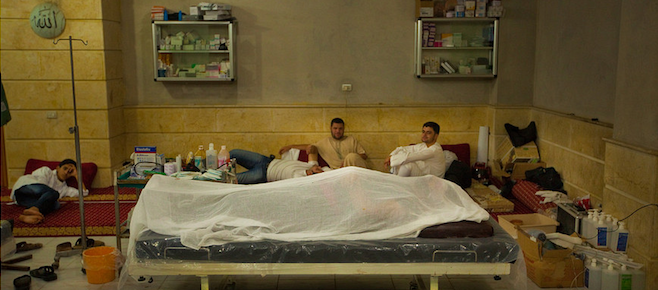The fight for Aleppo: Of bread lines, garbage piles, missiles and death — death everywhere
Jamie Dettmer reports from the frontline in Syria
Share

ALEPPO, Syria — An infant’s inert feet poke from underneath a grubby blanket. From the corner of the crowded makeshift field hospital, behind a curtain, a mother howls — not for her own injuries but for her 18-month-old daughter, Ahlam Saleh.
Her wails rise above the din of doctors and attendants, as an imam uncovers the child’s body: The world should see what Syrian President Bashar al-Assad does, he shouts. A medic promptly shoos away and gently replaces the blanket, muttering as he does so, “How can they kill like this?”
War snatched Ahlam’s life in a casual way, as a bright yellow sun set over the rural scene of her father’s small olive-tree farm on the outskirts of Al Bab, a town of 130,000 northeast of Aleppo. The family was piling into a car to head to town for iftar, the meal breaking a day’s fast during Ramadan, when a Syrian Air Force warplane circling above fired a missile close by, say relatives.
Ahlam isn’t the first infant to die and she won’t be the last in this vicious, dogged struggle to control Aleppo, Syria’s second-largest city. Both sides believe this could make or break the 18-month rebellion against Assad and death comes from warplanes, helicopter gunships, tanks and snipers.
The increased use of air power clearly hasn’t gone unnoticed in Washington. “We’ve seen a very troubling and despicable uptick in attacks from the air, perpetrated by the Syrian regime,” Pentagon spokesperson George Little said on Monday. He stopped short, though, of suggesting the imposition of a no-fly zone, as the rebels have demanded.
Human rights activists have been urging both sides to try to minimize civilian casualties. “As Syria deploys helicopters, fighter jets, tanks, and heavy artillery in populated areas of Aleppo, it should do everything feasible to protect civilians from harm,” said Anna Neistat of Human Rights Watch in a press release. Rebels too “should do what they can to minimize the risk to civilians in the fighting,” she adds.
But it’s hard to see how the Free Syrian Army could minimize the risks to civilians other than by retreating from Aleppo and evacuating the string of nearby towns they have fought so hard to gain. More than 60,000 civilians have sought sanctuary in neighboring Turkey, and 2 to 3,000 are crossing every day, many from Aleppo.
For those who stay behind, life gets more dangerous everyday. Gasoline is in short supply, medicines hard to get and long bread lines form whenever bakeries are able to open. In Aleppo, the air is filled with the stomach-wrenching stench of uncollected garbage.
Shelling in the Aleppo governorate between July 19 and August 9 alone killed 265 civilians, estimates the Violations Documentation Center, a Syrian monitoring group that works with local activists. At least another 166 died from gunfire.
The group doesn’t keep track of the wounded, but even its tally of the dead is likely an underestimation, as some civilians who are transported to Turkey for treatment die there, eluding the official count.
The field hospitals, mostly set up by mosques and Muslim charities, are struggling to fill the void left by the shuttered government hospitals and can’t keep patients for long. They treat the wounded, stabilize them and then send them back to their families.
“We are running low on the most basic things – we need sedatives, painkillers and antibiotics,” says Dr. Mohammed, who works at the Healing Center in the Shaar district of Aleppo, one of the city’s main makeshift triage centres. He declines to give his family name. “I won’t even know if [my patients] live or die.”
Outside Aleppo, airstrikes like the one that killed baby Ahlam are increasingly targeting the towns and roads that link the rebel-held areas with Turkey, suggesting that Assad’s military is trying to disrupt the insurgency’s supply routes.
These arteries are essential for the rebels and civilians – both as escape routes and as lifelines. Food, gas and medicine come in from the other side of the border.
Weapons make their way into Syria that way as well, “but not many,” says “Tony” al-Taieb, a member of the military council of the FSA. “The Turkish government turns a blind eye to some things but not others,” he adds. And rumours that the Qataris and Saudis are supplying the rebels with heavier weaponry are greatly overblown, he warns.
On Sunday, the FSA established there was no other way to address the weapons shortage but for rebel brigades to share ammunitions and guns.
The fight, though, goes on.